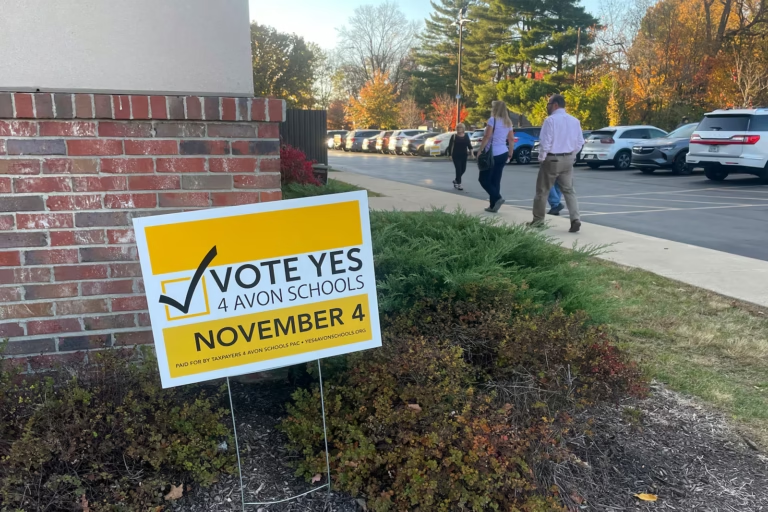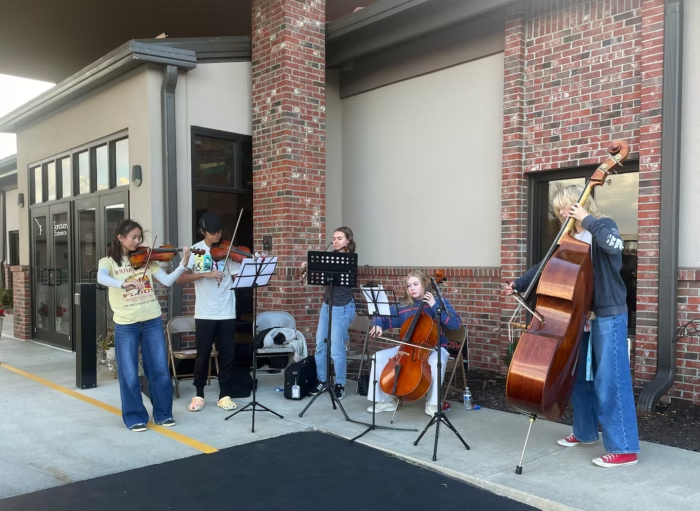
This story was originally published by Chalkbeat. Sign up for their newsletters at ckbe.at/newsletters
By MJ Slaby
Chalkbeat
Sign up for Chalkbeat Indiana’s free daily newsletter to keep up with Indianapolis Public Schools, Marion County’s township districts, and statewide education news.
Volunteers and district leaders wearing school colors stood outside the Avon United Methodist Church, a popular polling place in the Hendricks County town, handing out information about the only item on Tuesday’s ballot: a referendum for Avon Community Schools to pay for maintaining smaller class sizes, extracurriculars, and competitive teacher pay.
Nearby, members of the Avon High School orchestra played Christmas carols, and a steady stream of people arrived to cast their vote.
One hundred and seventy-three jobs, mostly teachers, were on the line. The vote was six months earlier than planned, due to changes made at the statehouse. And Lt. Gov Micah Beckwith went to Avon less than two weeks earlier to showcase his opposition to school referendums.
Avon Community Schools was one of six school districts with a referendum vote on Tuesday, an election watched by many as a test case for future school property tax measures due to multiple changes by lawmakers.
Unofficial results showed five districts – Avon, Cannelton City Schools, Duneland Schools, Hanover Schools, and Lake Central Schools – passed their referendums, all renewals of previous ones. Northwest Allen Community Schools, the only district with a new referendum, did not.
“We don’t take that support lightly and I’m excited to see all the many ways our students and educators will thrive in the coming years thanks to our community’s support,” Avon superintendent Scott Wyndham wrote in his victory message.
State law allows school districts to seek this additional revenue as a supplement to the local property tax dollars they receive, as well as state and federal funding. Referendums can be for construction, safety, or operating expenses. All six this year were operating referendums meaning they were to fund salaries and programming.

Earlier this year, state lawmakers passed measures to lower property taxes, which many expect to lower operating revenue for schools, increase how much of that funding some districts must share with charter schools, and restrict referendums to only general statewide elections, rather than during any primary or general election. This year was an exception for school boards that passed a resolution before June 30 to place a referendum on the November ballot.
“Indiana is now a referendum state and it’s only going to become more and more the case,” Wyndham said, adding that school leaders and educators are there to teach kids and provide the best schools possible. “Yet Indiana has put us in a situation where for the last three months we’ve been running a campaign.”
In Avon, the referendum was a renewal of the 2018 referendum, but at a lower rate, and campaign volunteers aimed to share what was at stake with the community.
One example was the orchestra playing outside the polls. Before the 2018 referendum, elementary schools shared teachers for “specials” like art, gym, and music. After the referendum, each school has a dedicated teacher for those classes, and the music program has grown. Avon now has the largest orchestra program in the state with over 1,000 students in grades six to 12 participating, per the district.
While referendum support was generally positive, Avon school leaders said misinformation also caused challenges.
Sarah Parent, an Avon school board member, said the district’s political action committee put in a lot of time and effort, equating it to a full-time job. “And many of us already have full-time jobs.”
Parent, who has three children in the district, added that she thinks referendums are divisive and wants to see more school funding from the state legislature so that schools don’t have to do them, eliminating ”one extra thing that’s dividing the community right now.”
Both Parent and Wyndham encouraged people in Avon to stay involved with the schools and do their research, especially if they have questions about the district or voted against the referendum.
“Win or lose,” Parent said, “there’s lots of big decisions to be made.”
Below are unofficial results for the November 2025 Indiana school referendums:
Chalkbeat Indiana reporter Aleksandra Appleton contributed to this story.
MJ Slaby oversees Chalkbeat Indiana’s coverage as bureau chief. Contact MJ at mslaby@chalkbeat.org.
Chalkbeat is a nonprofit news site covering educational change in public schools.